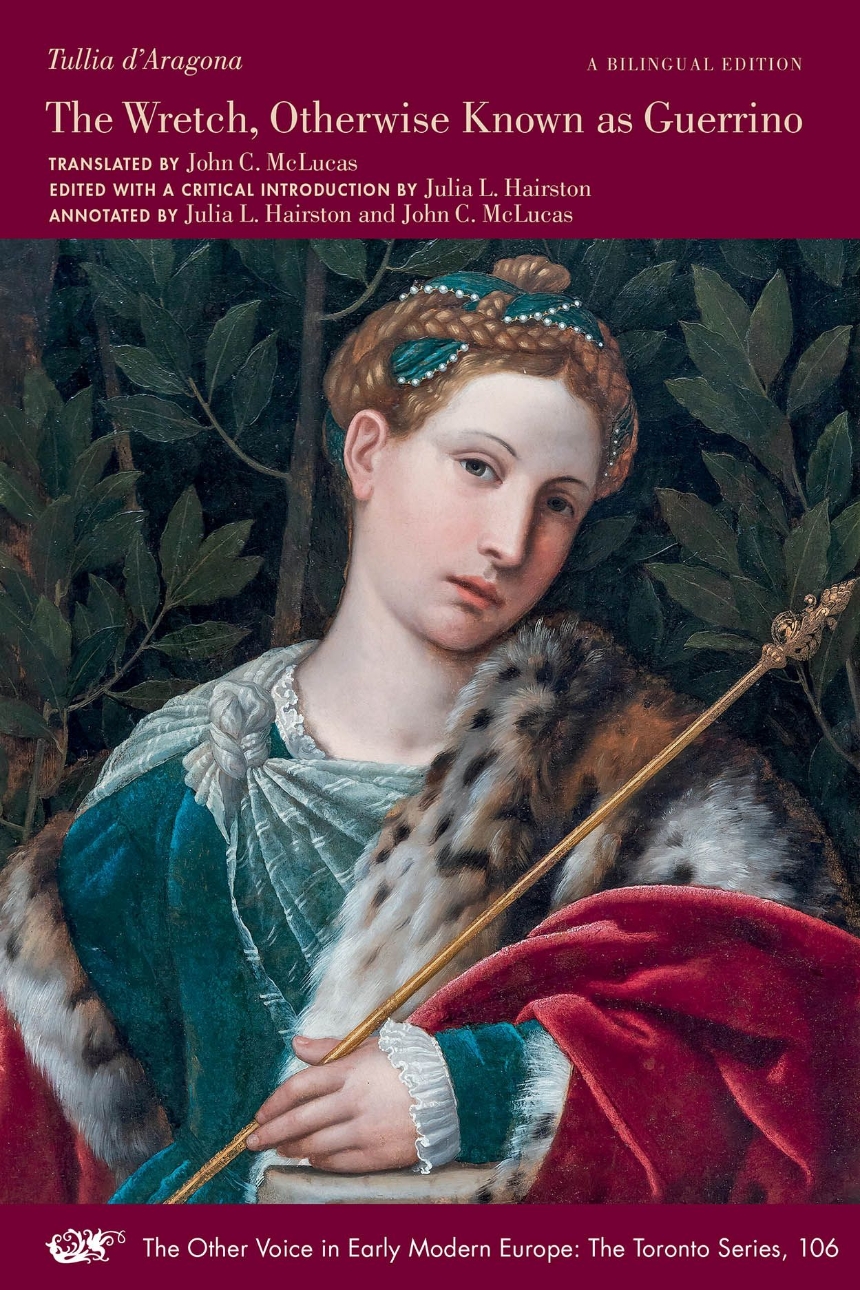The Wretch, Otherwise Known as Guerrino
Written in Ottava Rima by Signora Tullia d’Aragona, a Work in Which One May See and Learn to Know the Main Parts of the Whole World, Along with Many Other Very Pleasant Things, Which Will Be Extremely Welcome to Every Kind of Intelligent Reader.
Bilingual edition
9781649591104
Distributed for Iter Press
The Wretch, Otherwise Known as Guerrino
Written in Ottava Rima by Signora Tullia d’Aragona, a Work in Which One May See and Learn to Know the Main Parts of the Whole World, Along with Many Other Very Pleasant Things, Which Will Be Extremely Welcome to Every Kind of Intelligent Reader.
Bilingual edition
The only English translation of the first epic poem to be authored by an Italian woman.
This is a bilingual, fully annotated edition of Tullia d’Aragona’s epic poem The Wretch. This mid-century epic reflects the many historical and religious changes taking place in the first half of the sixteenth century in Europe and the burgeoning literary debates following the publication of another Italian epic poem, Ariosto’s Orlando Furioso. The Wretch recounts the adventures of Guerrino, a nobleman captured by pirates as an infant and sold into slavery. His famous quest in search of his parents and his identity involves abductions, same-sex seductions, and skirmishes with fantastical beasts as he travels through Europe, Turkey, Africa, India, Arabia, and the Purgatory of St. Patrick. The poem occupies an important position in the development of the prestigious epic genre, the highest step on the ladder to literary recognition and fame, and Tullia’s work paved the way for the epics of other women writers in subsequent decades.
This is a bilingual, fully annotated edition of Tullia d’Aragona’s epic poem The Wretch. This mid-century epic reflects the many historical and religious changes taking place in the first half of the sixteenth century in Europe and the burgeoning literary debates following the publication of another Italian epic poem, Ariosto’s Orlando Furioso. The Wretch recounts the adventures of Guerrino, a nobleman captured by pirates as an infant and sold into slavery. His famous quest in search of his parents and his identity involves abductions, same-sex seductions, and skirmishes with fantastical beasts as he travels through Europe, Turkey, Africa, India, Arabia, and the Purgatory of St. Patrick. The poem occupies an important position in the development of the prestigious epic genre, the highest step on the ladder to literary recognition and fame, and Tullia’s work paved the way for the epics of other women writers in subsequent decades.
1,240 pages | 6 x 9 | © 2024
The Other Voice in Early Modern Europe: The Toronto Series
Literature and Literary Criticism: Romance Languages
Reviews
Table of Contents
Acknowledgments
Abbreviations
Introduction
The Wretch and the Other Voice
Tullia d’Aragona: Life and Works
Paratext
Dedication of Claudio Rinieri to Giulio della Valle
Preface: Tullia d’Aragona to Her Readers
Summary of The Wretch, Otherwise Known as Guerrino
Epic, Style, Meter, Narrator, Gender, and Reason in The Wretch
The Hero
Guerrino and Religion
Translator’s Note
Editorial Norms for the Italian Edition
List of Corrections
Imperfect Rhymes and Rhyme Schemes in the Poem
Sinossi dei canti
Canto Synopses
Il Meschino, altramente detto il Guerrino
Dedica
Tullia d’Aragona ai lettori
Canti 1–36
The Wretch, Otherwise Known as Guerrino
Dedication
Tullia d’Aragona to Her Readers
Cantos 1–36
Bibliography
Index
Abbreviations
Introduction
The Wretch and the Other Voice
Tullia d’Aragona: Life and Works
Paratext
Dedication of Claudio Rinieri to Giulio della Valle
Preface: Tullia d’Aragona to Her Readers
Summary of The Wretch, Otherwise Known as Guerrino
Epic, Style, Meter, Narrator, Gender, and Reason in The Wretch
The Hero
Guerrino and Religion
Translator’s Note
Editorial Norms for the Italian Edition
List of Corrections
Imperfect Rhymes and Rhyme Schemes in the Poem
Sinossi dei canti
Canto Synopses
Il Meschino, altramente detto il Guerrino
Dedica
Tullia d’Aragona ai lettori
Canti 1–36
The Wretch, Otherwise Known as Guerrino
Dedication
Tullia d’Aragona to Her Readers
Cantos 1–36
Bibliography
Index

